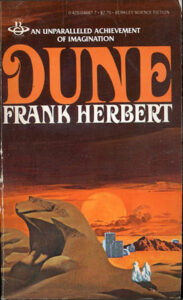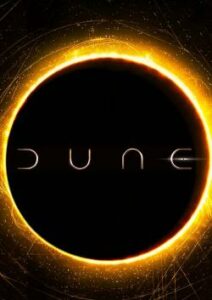Confession time: Though I have read Dune several times after encountering it at an early and impressionable age, I don’t think that I have read it this century. My recollection is more impressionistic than detailed, and my impression is that the movie got all of the most important parts of the story up on the screen and made the famously sprawling story comprehensible. One important caveat is that the 2021 Dune only tells part of the novel’s tale. (Discussion of the plot for a book that’s been out for more than 50 years may reveal some of its details.)
It goes as far as Paul and Jessica’s escape into the desert after the Harkonnen attack on the Atreides. I was discussing it with a friend this morning and said that’s at most a third or a fourth of the way through the book — the friend said more like an eighth — but on reflection it also makes considerable sense. Everything leading up to Paul going into the desert is Before; everything that follows is After. The Harkonnen attack and devastation of House Atreides, though it comes relatively early in the novel, is the hinge of the external action, and that’s what the movie is made to show.
Paul’s journey to becoming Muad’Dib is an internal journey; his eventual leadership of the Fremen is the external one that the second half of Dune — assuming it gets made in the nearish future — will presumably show. It will be a great, epic visual story when the second half is done, if it is done on the scale of the first.
As a story to watch, Dune is brilliant. It’s a fully developed interstellar civilization, complete in itself, and alien. (While there are, inevitably, recognizable bits of earthly cultures, it’s not like Game of Thrones where I called the first season “War of the Roses plus Mongols,” and was able to add, “Yep, there’s the Vikings, there’s Henry VIII” and so forth.) This is a far future with a deep past, and both aspects are visible on the screen. I could happily watch for many hours. Listen, too. The movie’s score, by Hans Zimmer, melds the times and cultures up on the big screen, conveying emotions and also providing sounds that are simultaneously familiar and strange.
Though the film clocks in at just over two and a half hours, Dune is epic enough that some key characters and concepts are given relatively short shrift. Mentats were something that appealed to precocious me when I first read the book; they’re shown but not really explained for anyone not already familiar with how Herbert’s worlds work. Viewers don’t know why the Atreides trust Dr Yue; they’ll be less surprised at what happens than the characters are. Gurney Halleck gets off one of the movie’s few funny lines; who he is and why he stands next to the Duke are hardly explored at all. Cuts had to be made, even for a long movie. In general, Dune has made them judiciously.
Some of the flaws in the story come straight from the novel. House Atreides has supposedly been around for thousands of years without fully internalizing the concept of “an heir and a spare.” Yes, yes, Jessica and the Bene Gesserit breeding project and all that. Still. Failure to have an adult heir is the key failure mode of noble lines. It’s best not to think too hard about how sandworms could work. It’s also best not to think too hard about the Fremen industrial base, where all that technology comes from, or how it got developed. (Or if you do want to think entirely too hard about the Fremen, here is a good place to start.)
The flaw, such as they are, were easy for me to ignore in exchange for an enormous, gorgeous compelling story. I hope to catch it again, on the biggest screen that I can find.



2 comments
Wow, only till Paul and Jessica flee to the desert? Like, I can see why, but am still somewhat boggled. Also in that there are still chunks of exposition skipped over! I’m very excited to see this, tho, and hope it doesn’t suffer from the insufferable misogyny that pervaded the book.
Author
I hope you like it!